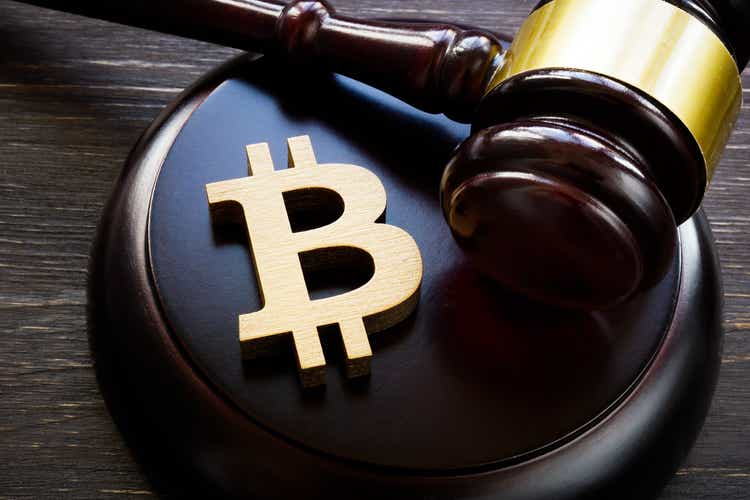
designer491 A bill introduced by a handful of U.S. senators looking to empower the Commodity Futures Trading Commission to regulate bitcoin (BTC-USD) and ethereum (ETH-USD) would deem the two largest cryptocurrencies by market cap as so-called digital commodities in a move that could “potentially free up billions of capital” into them, said Marcus Sotiriou, an analyst at digital asset broker GlobalBlock. If the proposed bipartisan legislation, aka the Digital Commodities Consumer Protection Act, were to take effect, “it would mean that these [BTC and ETH] are the only cryptos that are not able to be classified as securities, which would remove a significant concern for side-lined institutions,” Sotiriou wrote in a note on August 4. The key part of this bill is that bitcoin (BTC-USD) and ether (ETH-USD) would not be classified as securities. Generally, if a digital token were categorized as a security, crypto exchanges such as Coinbase Global (COIN), for example, would likely find themselves burdened since they would have to then register with the Securities and Exchange Commission for listing securities, and would have to pay fines if they didn’t, Sotiriou explained to Seeking Alpha via email. “Therefore, the Ethereum (ETH-USD) token’s price would likely fall due to exchanges delisting it, to avoid facing fines for breaking securities laws,” he added. Meanwhile, Senate Agriculture Committee Chairwoman Debbie Stabenow (D-MI) and Sen. John Boozman (R-AR), both of whom are sponsoring the measure among a total of four senators, are seeking to close regulatory gaps in the crypto space by putting the derivatives regulator at the forefront of monitoring bitcoin (BTC-USD) and ether (ETH-USD) as well as digital commodity platforms, including trading facilities, brokers and custodians. “One in five Americans have used or traded digital assets — but these markets lack the transparency and accountability that they expect from our financial system. Too often, this puts Americans’ hard-earned money at risk,” Stabenow said in a statement after unveiling the bill on Aug. 3. “That’s why we are closing regulatory gaps and requiring that these markets operate under straightforward rules that protect customers and keep our financial system safe.” As headlines over the past year have shown, SEC Chair Gary Gensler has been quite vocal about wanting to apply traditional disclosure and anti-fraud provisions to cryptos. While he previously contended that bitcoin (BTC-USD) is a commodity, Gensler told CNBC early in 2022 that "it's about bringing it [crypto] into the securities laws and, unfortunately, way too many of these are trying to say 'well, we're not a security, we're just something else.'" In April, Gensler said he sees a nearly zero chance that crypto platforms don't trade any securities. Of note, the $1T crypto space is largely unregulated and certainly doesn’t fall under a singular regulatory regime. There hasn’t yet been any cryptos to have a legal status as a commodity or a security, so the Stabenow-Boozman bill is something that crypto exchanges and custodians are likely paying close attention to, Sotiriou said. Executives in the crypto industry have been striving for regulatory clarification to further advance their businesses while complying with rules. But the uncertain regulatory backdrop is hindering that vision. A raft of high-profile players at the end of last year urged Congress to shed more light on federal supervision. Specifically, Charles Cascarilla, the CEO of blockchain firm Paxos, spoke before a House of Representatives committee, saying "the uncertain state of digital asset regulation is hampering the industry’s dynamism." Lawmakers in recent weeks have been racing to advance legislation ahead of midterm elections in November. Towards the end of July, for instance, Senators Patrick Toomey (R-PA) and Kyrsten Sinema (D-AZ) introduced a bill that would end taxes on small crypto transactions. In the past week, Sen. Elizabeth Warren (D-MA), who is known for her anti-crypto campaign, called for the Office of the Comptroller of the Currency to make it more difficult for Wall Street banks to offer crypto-related services to its clients, Bloomberg reported, citing a draft copy of a letter. She ultimately wants the OCC to team up with the Federal Reserve and the Federal Deposit Insurance Corporation to form a new and improved approach to crypto in a way that safeguards consumers and supports the “soundness of the banking system,” the letter read. Warren is asking her Senate colleagues to support her letter of which a final version was planned to be sent to Acting Comptroller Michael Hsu, Bloomberg said, noting an aide of Warren. While legal concerns about crypto are increasingly looming, some Wall Street banks are still showing interest in the space despite a cyclical market slump that has a ways to go before breaching 2021's heights. The latest case occurred when BlackRock (BLK), the world's largest asset manager, teamed up with Coinbase (COIN) on August 4 to allow its institutional clients to trade bitcoin (BTC-USD). Previously, (May 27) Senator Cynthia Lummis’ crypto bill addressed regulatory blind spots. Dear readers: We recognize that politics often intersects with the financial news of the day, so we invite you to click here to click here to join the separate political discussion.












Comments
0 comment